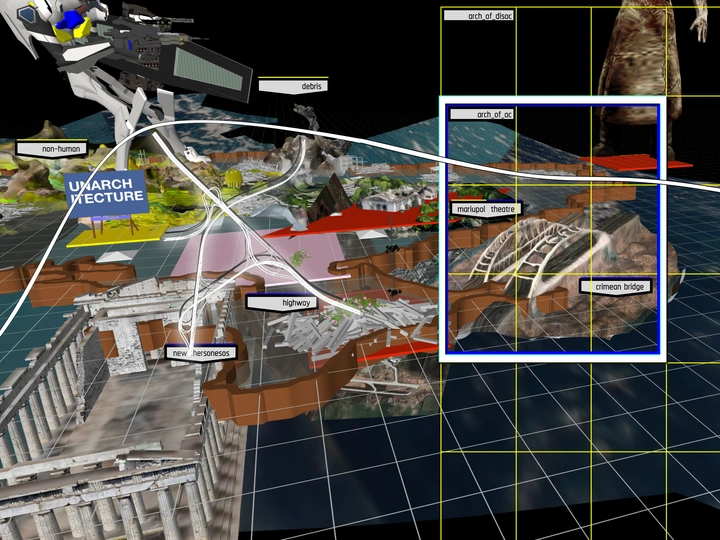Architecture of occupation

Svitlanka Konoplyova
Ivanna Kozachenko
Borys Medvedik
Sebastian Wells
commercial public art is a Ukrainian art group and research project. The members of the group work at the intersection of disciplines, drawing on their experience of activism and work in architecture and urbanism. In their practice, commercial public art artists actively use participatory methods and reveal the topics of identity, branding, market, architectural speculation, and the influence of various media on human perception. Participated in the Ukrainian pavilion at the 18th Venice Architecture Biennale 2023 with the project "March off". Partnered with Cultural Geographies, Kharkiv School of Architecture, MNPL Workshop, Kotsiuba landscape studio, Система Odesa, Pinchuk Art Centre, Galeria Labirynt, Triangle-Astérides, GIZ, House of Europe, Brave Factory, Kyiv Corner, Ukrainian Modernism, etc.
Svitlanka Konoplyova is a Ukrainian artist, researcher, and architect. She was born in Crimea. As an artist, she engages in spatial and performative practices. As an architect, she works with urban public spaces. The events of the Russian-Ukrainian war influenced interest in the topic of memory of places, commemoration, and the search for spatial identity ("Monument of Oblivion", Odesa, 2023). The war observation is reflected in projects about the architecture of occupation and de-occupation ("The garden is now a highway", Kyiv, 2023; "March off", Venice, 2023). Also, the area of her research is the representation of territories, in particular the Ukrainian south ("Odesa-Marseille", 2023). Worked as a part of the Commercial Public Art collective.
Ivanna Kozachenko is a Kyiv-based curator and independent writer who holds a B.A. in Mathematics from Kyiv National Taras Shevchenko University. She is currently working as an editor and contributor to Solomiya magazine, as well as the editor of the third issue of "Living the War," a print publication documenting the stories of Ukrainians living in Russian-occupied Ukrainian territories.
The project is relevant to the issue of redefining the architecture, and environmental experiences and gained focus on human and non-human actors that radically influence our perception of surroundings. The milestone was provoked by Ivanna K when she noticed the architecture of occupation in one of our works about Svitlanka Konoplyova`s Crimean experience. Ivanka wrote an article on it and described the logic of an enhanced range of environments and their beneficiaries. Through the formulation and testing of hypotheses, she investigates the multifaceted impact of occupation on various dimensions. Our study focuses on the occupied territories of Ukraine, where we observe both the destructive and proactive tendencies of occupation, including the manipulation of testimonies, developing infrastructure, rewriting of history, rebuilding, alteration of landscapes, and establishment of novel forms of communication. By scrutinizing illustrative examples, we aim to shed light on the mechanisms through which nonhuman actors shape and redefine the occupied space, ultimately contributing to a deeper understanding of the dynamics of contemporary conflict zones. We aim to investigate the relationship between the architecture of occupation and de-occupation: what patterns of behavior in space do they have? How do they interact with the past? How do they shape the future?
For Lina, we`d like to expand this way of defining with the global cases (for example, on ecology) and the ones from fictional worlds. As a result, we expect to have a new point of seeing global processes, that may raise awareness and/or techniques to fix global problems such as those of CBT are fixing mental issues on a human-human scale.